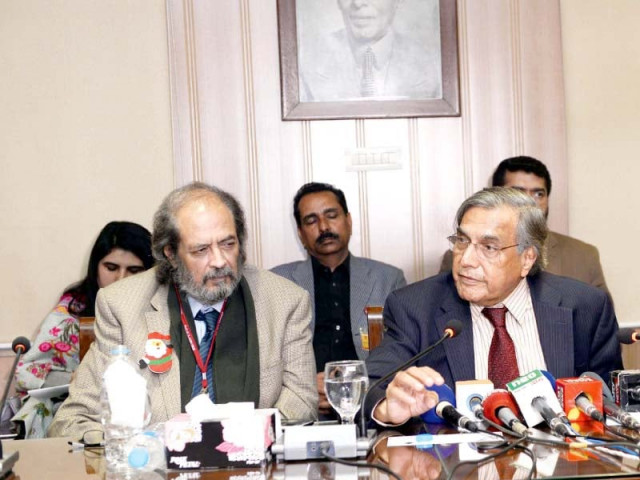Speakers stress need to impose ‘population emergency’ in Pakistan
Two-day moot titled Population Growth: Investing in Human Resource Development will begin tomorrow at GCU

Punjab Higher Education Commission Chairperson Dr Muhammad Nizamuddin speaks at a press conference at GCU. PHOTO: EXPRESS
This was stated by Punjab Higher Education Commission (PHEC) Chairperson Dr Muhammad Nizamuddin.
He was addressing a press conference on Monday at the Government College University (GCU) Lahore to launch the 18th National Population Research Conference.
"The Population Census 2017 has brought critical issues to the forefront that has far-reaching implications for the development of Pakistan. Unprecedented growth rates, emerging urban poles, youth bulge and a growing elderly population are some of the many challenges that our country faces today", said Dr Nizamuddin, who is also the President of Population Association of Pakistan (PAP).
"If the current pattern of fertility continues, then on the 100th birthday of Pakistan, the country's population is estimated to be around 390 million. Concerted efforts are required now on the federal and the provincial levels in order to address these issues in a timely manner," he said.
Dr Nizamuddin revealed that the GCU, PHEC and PAP were holding the Population Research Conference from December 20, 2017 where all stakeholders would convene at a single platform to deliberate upon all issues related to population growth and human resource development. The PAP president further said that the onus of population growth could not put on the government alone, rather it was shared. "I believe that universities and non-government organisations have a bigger role in creating awareness."
He proposed to establish the Population Welfare Studies Centre in all universities, saying that GCU must take lead in this regard.
The PHEC chairman also said that average population growth rate of Pakistan was 2.4 but it was less than 2 in cities which meant that NGOs or government's population control programme were not reaching the rural areas.
He said that at the current economic growth rate, providing employment to the youth of the country was not possible. He said that the increasing population would affect every sector of the country, including education, health, agriculture, housing etc. "Apart from youth, the increasing number of elderly people without any social protection is also a huge challenge which is needed to be overcome."
GCU Vice Chancellor Prof Dr Hassan Amir Shah said that population growth should be handled proactively rather than reactively. "We know that our population is estimated to be around 400 million in the next 30 years, so we have to start taking concerted steps now on all levels instead of taking reactive measures later," he added. He also proposed that population studies should be part of curricula at all levels of education.
University of Education Vice Chancellor Prof Rauf-e-Azam said that population control was a sensitive issue for which all stakeholders should be taken on-board to suggest pragmatic solutions. "This conference by PAP is a right step in the right direction and its proceedings will be sent to the government and policymakers for developing a future roadmap," he concluded.
Bargad Executive Director Sabiha Shaheen believed that population growth could not be controlled, rather initiatives must be taken to manage it now. "There is a huge youth bulge in the country which should be managed so that they could play an effective role for the development of the country instead of becoming a burden on the economy," she added. She also laid stress on cultivating an entrepreneurial mindset among youth.
GCU Political Science Department Chairman Dr Khalid Manzoor Butt said that many models were available for population control such as Chinese and Malaysian models but there was a lack of political will in the country. He said that there were pressure groups that don't allow the government to introduce radical reforms in this direction. Eminent historian Prof Dr Tahir Kamran also spoke at the press conference.
Published in The Express Tribune, December 19th, 2017.



















COMMENTS
Comments are moderated and generally will be posted if they are on-topic and not abusive.
For more information, please see our Comments FAQ